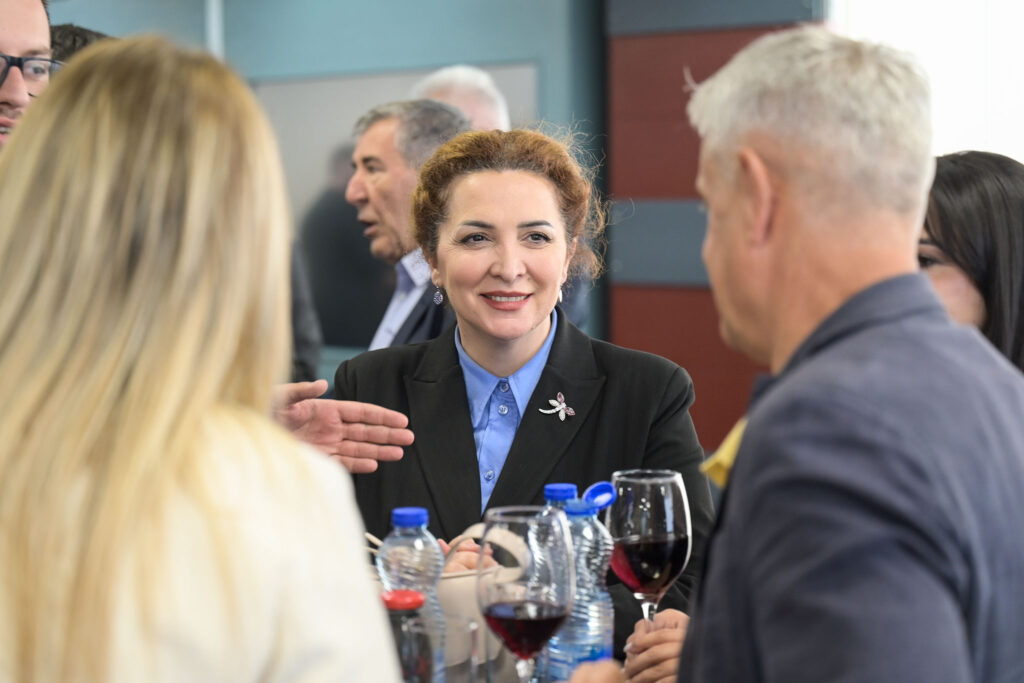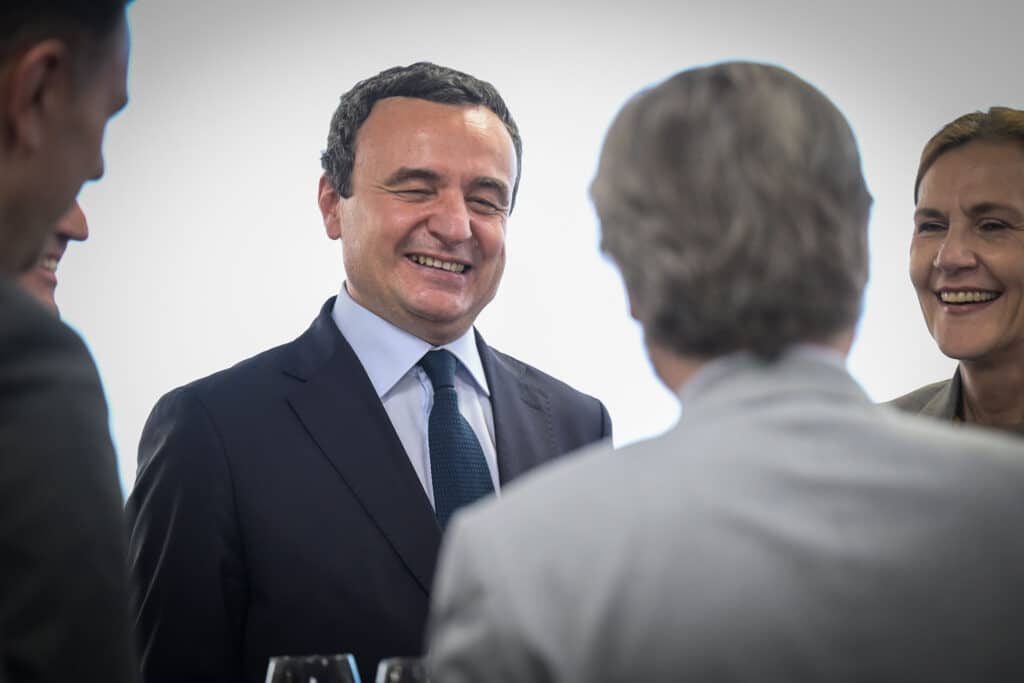Prishtinë, 8 maj 2025
Në ndërtesën e Qeverisë, u organizua sot pritje në shënim të Ditës së Fitores në Evropë, në 80-vjetorin e mbarimit të Luftës së Dytë Botërore, në prag edhe të shënimit të Ditës së Evropës. Kryeministri në detyrë i Republikës së Kosovës, Albin Kurti, bashkë me kabinetin qeveritar, mirëpriti ambasadorë e përfaqësues të misioneve diplomatike në vendin tonë.
“Në rastin historik të Ditës së Fitores tetëdhjetë vjet më parë, festimet që shënuan fundin e luftimeve u përhapën jo vetëm nëpër kontinent, por në mbarë botën. Gëzimi dhe lehtësimi i miliona ushtarëve dhe qytetarëve të zakonshëm ishte i kuptueshëm, duke pasur parasysh koston marramendëse njerëzore të luftës. Deri më sot, mbetet konflikti më vdekjeprurës në historinë njerëzore, me rreth 70–85 milionë jetë të humbura, mbi 60% prej të cilëve ishin civilë. Vetëm në Holokaust, gjashtë milionë hebrenj dhe miliona të tjerë u vranë.” u shpreh kryeministri në hyrje të fjalës së tij.
Kryeministri tha se çdo përpjekje për të gjetur shpresë në atë katastrofë duhet të fokusohet kryesisht në përpjekjet e pasluftës për të parandaluar që diçka e tillë të mos ndodhë përsëri.
“Mes rrënojave morale të luftës, u mbollën farat e paqes. Dekadat pas Luftës së Dytë Botërore panë themelimin e institucioneve madhore ndërkombëtare për të drejtat e njeriut, demokracinë, paqen dhe bashkëpunimin.” tha kryeministri Kurti.
Në vijim, kryeministri theksoi se tetëdhjetë vjet pas përfundimit të Luftës së Dytë Botërore në Evropë, ka shenja se duhet të dyfishojmë përpjekjet tona për të përforcuar dhe zgjeruar këto institucione thelbësore duke përfshirë shtete të tjera demokratike, sikurse Kosova. Shtoi se invazioni i pajustifikuar i Rusisë ndaj Ukrainës është një kërcënim i vazhdueshëm për paqen në kontinentin tonë e ndryshe nga Lufta e Dytë Botërore, kërcënimi i agresionit tashmë vjen nga jashtë kontinentit tonë dhe jo nga brenda.
“Nuk kam asnjë dyshim se këto kërcënime mund t’i kapërcejmë së bashku. Evropa ka burime për mbrojtje dhe ide për përparim. Gjithçka që duhet është vullneti për bashkëpunim dhe ndjenja e solidaritetit. Prandaj, në këtë tetëdhjetëvjetor të Ditës së Fitores, jemi të thirrur jo vetëm të përkujtojmë të kaluarën, por edhe të mbrojmë të ardhmen.” përfundoi fjalën e tij kryeministri Kurti.
Fjala e plotë e kryeministrit Kurti:
His Excellency Ambassador Aivo Orav, Head of the European Union Office in Kosova,
Honorable Ambassadors, Heads of Missions, Chargé d’Affaires, deputy Heads of Missions and representatives of Embassies,
Members of the Government and Parliament of our Republic,
Honorable ladies and gentlemen,
On May 8th, 1945 — nine days after Hitler’s suicide — Field Marshal Wilhelm Keitel signed the German Instrument of Surrender, bringing an end to World War II in Europe. We are gathered here to commemorate the 80th anniversary of that day, commonly known as Victory in Europe Day, or V-E Day, and to express our gratitude to all those who gave their lives to make that victory possible.
On the historic occasion of V-E Day eighty years ago, celebrations marking the end of the fighting spread not only across the continent, but around the world. The joy and relief of millions of soldiers and ordinary citizens was understandable, in light of the war’s staggering human toll. To this day, it remains the deadliest conflict in human history, with an estimated 70–85 million lives lost, over 60% of whom were civilians. In the Holocaust alone, six million Jews, and millions of others, were murdered.
The American philosopher and World War II veteran, John Rawls, understood how difficult it was to make sense of the conflict, and especially the Holocaust. Drawing a sharp contrast with the American Civil War, he remarked: “When Lincoln interprets the Civil War as God’s punishment for the sin of slavery, deserved equally by North and South, God is seen as acting justly. But the Holocaust can’t be interpreted in that way.” The depth and the scale of human evil displayed in World War II was simply too great to be understood in any other way than as an unmitigated moral catastrophe.
Any attempt to find some silver lining in that catastrophe must focus primarily on the postwar efforts to prevent something like it from ever happening again. Amidst the moral ruins of war, the seeds of peace were planted. The decades following World War II witnessed the founding of the major transnational institutions for human rights, democracy, peace, and cooperation. It is especially fitting that the day after V-E Day, on May 9th, we celebrate Europe Day, because some of the most important of these postwar institutions are concentrated on our continent, including the Council of Europe, the European Union, and NATO. Kosova in particular is the perfect setting to celebrate these vital international organizations, all of which we aspire to join. Europe is our continent, Europe is our destiny. Even our national anthem is called “Europe.”
And yet, eighty years after the end of World War II in Europe, there are signs that we must redouble our efforts to reinforce and expand these essential institutions to include other strongly democratic states, like Kosova. Russia’s illegal invasion of Ukraine — a constant menace to peace on our continent — has now entered its fourth year. Unlike in World War II, the threat of aggression comes from outside our continent, not from within. Indeed, the celebration in Moscow today — which Serbia’s president has obediently joined, assuming he doesn’t fall ill again — displays not the pride of victory over Nazism and fascism, nor sympathy for World War II’s victims; rather, it reflects Russia’s nostalgia for marching its army westward into Europe. Relatedly, right-wing extremists pose a growing threat even to Europe’s most established democratic societies. It is no accident that many of these extremists are apologists for Russia and its war crimes in Ukraine. The ideology of neofascism has a natural kinship with the preposterous aggression of today’s Russian Federation.
I have no doubt that we can overcome these threats together. Europe has both resources for protection and ideas for progress. All it takes is the will for cooperation and feeling of solidarity.
And so, on this eightieth anniversary of V-E Day, we are called upon not only to commemorate the past, but to defend the future. For this reason, it has been a priority of the Government I lead, to serve as a beacon and a bulwark of democracy in our region and beyond. Now more than ever, we must all do our part to uphold our common values, both at home and abroad.
Let us therefore raise a glass — in honor of all those who contributed to victory in Europe in 1945, and with shared determination and anticipation of many victories to come.
Thank you!






























